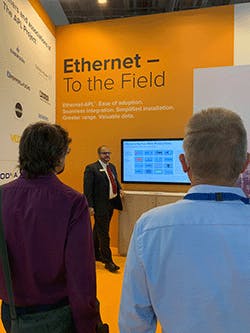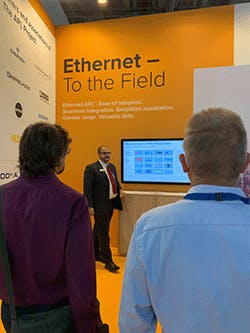Ethernet-APL Project completed
After almost 4 years of close collaboration between the four standards development organizations, FieldComm Group, ODVA, OPC Foundation, and PROFIBUS & PROFINET International (PI), combined with support from 12 major industry project partners, the Ethernet-APL Project participants have announced the successful completion of the project. The result is a completely available 10Mbit technology for a new two-wire, intrinsically safe physical layer called Ethernet-APL.
For the technical experts involved in the APL Project, it was important that the specifications of IEEE 802.3cg (10BASE-T1L) were suitable for use in process automation. Additionally, it was essential for the experts that the technology be based on an IEEE standard to form an ideal foundation for the Ethernet-APL technology. Therefore, the APL Project experts have supported the IEEE standardization activities. To achieve an intrinsic safety solution that meets all of the requirements of the process industry, the experts worked with TüV, the certification body for intrinsic safety, to validate the developed explosion protection concepts and prepare for standardization of Ethernet-APL in the IEC.
The main results of the APL Project are port profile specifications to create the Ethernet-APL solution for multiple power levels with and without explosion hazardous area protection, engineering guidelines and best practices for planning and installation, and conformance test specifications and test tools. As a single physical layer, Ethernet-APL supports EtherNet/IP, HART-IP, OPC UA, PROFINET or any other higher-level network protocol.
To support rapid and efficient implementation of Ethernet-APL technology in products, the APL Project worked with semiconductor manufacturers to bring 10BASE-T1L Phy chipsets for Ethernet-APL to market. This made it possible for the industry partners to launch their products before the end of the APL Project. With the successful completion of the project, all interested companies can now integrate Ethernet-APL into their products.
End users have shown great interest in using Ethernet-APL in their plants. As a result, some companies have already completed successful field trials. BASF and Procter & Gamble, for example, have demonstrated that Ethernet-APL has suitability for use in process applications through their internal testing.
In order to support Ethernet-APL in the long term, the participating standards development organizations have agreed to jointly maintain the technical and marketing assets and to continue international standardization efforts. In addition, the marketing team of the APL Project has created a set of materials to support interested parties in adopting Ethernet-APL.



